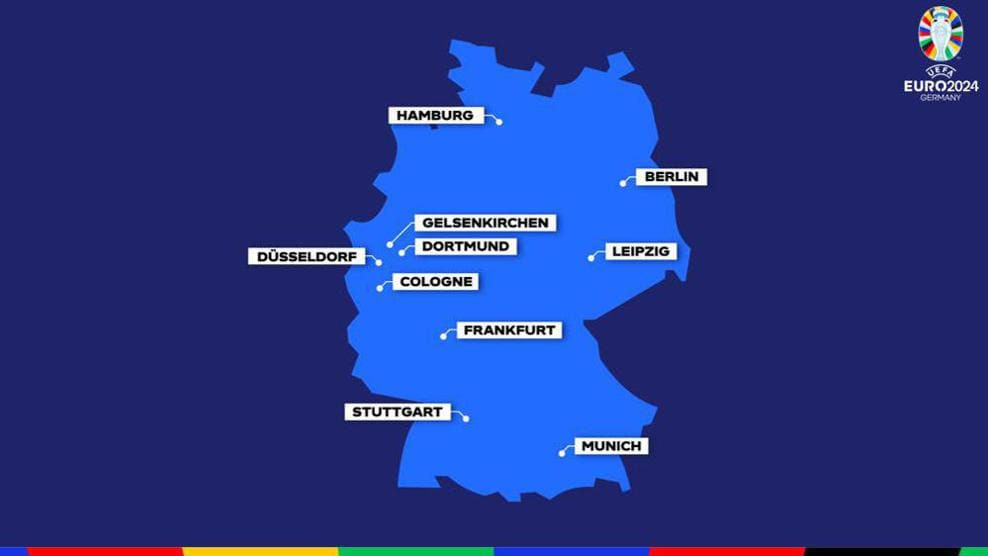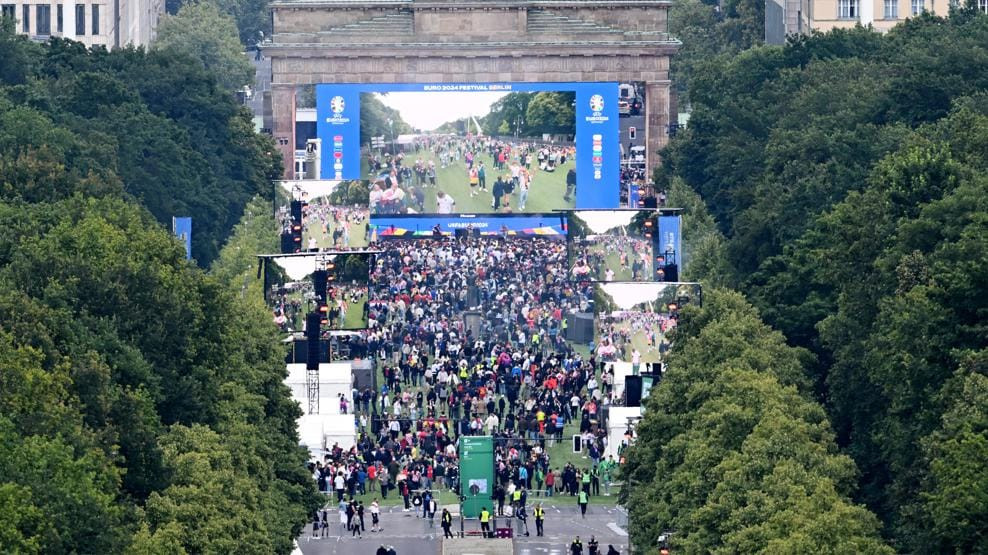The UEFA European Championship, widely celebrated as the Euros, stands as a pinnacle of international football competition, captivating fans worldwide. Following the exhilarating EURO 2024 tournament, a common question arises: Where Is The Euros 2024? The prestigious hosting honor for the 17th edition was bestowed upon Germany, a country renowned for its rich football heritage and passionate fanbase. This article will explore the details of EURO 2024’s location, highlighting the chosen host cities, state-of-the-art venues, and key facets of the tournament that unfolded across Germany.
Germany’s selection as host for EURO 2024 was confirmed at a UEFA Executive Committee gathering in Nyon on September 27, 2018. Facing competition from Türkiye, Germany emerged as the preferred choice. While West Germany previously hosted EURO 1988, this marked the first time unified Germany staged the UEFA European Championship, adding another major football event to their history, alongside the 2006 FIFA World Cup.
EURO 2024 unfolded across a vibrant summer, commencing on June 14th and culminating on July 14th, 2024. The group stage matches thrilled fans until June 26th, paving the way for the knockout stage which began on June 29th. As the host nation, Germany automatically qualified and was placed in Group A, positioned at A1. They inaugurated the tournament with a memorable 5-1 victory against Scotland at the Munich Football Arena on the opening day, June 14th. Germany (including West Germany) has been a consistent presence at the Euros since 1972, with a strong history of success, including victories in 1972 and 1980 as West Germany, and again in EURO ’96 as unified Germany.
The draw to determine the final tournament groups was held in Hamburg on December 2, 2023, setting the stage for the exciting matchups to come.
EURO 2024 Groups:
Group A: Germany, Scotland, Hungary, Switzerland
Group B: Spain, Croatia, Italy, Albania
Group C: Slovenia, Denmark, Serbia, England
Group D: Poland, Netherlands, Austria, France
Group E: Belgium, Slovakia, Romania, Ukraine
Group F: Türkiye, Georgia*, Portugal, Czechia
*Qualified via play-offs
The tournament format mirrored the successful structure of UEFA EURO 2020. The top two teams from each of the six groups, along with the four best third-placed teams, advanced to the round of 16, ensuring a high level of competition and excitement throughout the knockout stages.
The grand finale of EURO 2024 took place in Berlin’s iconic Olympiastadion on Sunday, July 14th, 2024. In a thrilling match, Spain triumphed over England with a 2-1 victory, securing their fourth EURO title and becoming the first nation to achieve this milestone.
EURO 2024 was hosted across ten dynamic cities throughout Germany, utilizing a mix of modern and historically significant stadiums. Nine of the venues were also used for the 2006 World Cup, with the addition of the Düsseldorf Arena. Notably, the Munich Football Arena had the distinction of hosting matches for the second consecutive Euros, having been among the 11 venues for UEFA EURO 2020.
EURO 2024 Host Cities and Stadiums:
- Berlin: Olympiastadion Berlin (Capacity: 71,000)
- Cologne: Cologne Stadium (Capacity: 43,000)
- Dortmund: BVB Stadion Dortmund (Capacity: 62,000)
- Dusseldorf: Düsseldorf Arena (Capacity: 47,000)
- Frankfurt: Frankfurt Arena (Capacity: 47,000)
- Gelsenkirchen: Arena AufSchalke (Capacity: 50,000)
- Hamburg: Volksparkstadion Hamburg (Capacity: 49,000)
- Leipzig: Leipzig Stadium (Capacity: 40,000)
- Munich: Munich Football Arena (Capacity: 66,000)
- Stuttgart: Stuttgart Arena (Capacity: 51,000)
 Aerial view of the ten EURO 2024 host cities across Germany
Aerial view of the ten EURO 2024 host cities across Germany
Sustainability was a key focus for EURO 2024, aligning with growing expectations for football to prioritize environmental and social responsibility. UEFA implemented a comprehensive Environmental, Social and Governance (ESG) strategy to ensure the tournament set a benchmark for sustainability in sports.
Each host city created vibrant fan zones, offering public viewing and a festive atmosphere for supporters to gather and celebrate the tournament.
 Fans celebrating in the Berlin fan zone during a EURO 2024 match
Fans celebrating in the Berlin fan zone during a EURO 2024 match
The official match ball of EURO 2024, FUSSBALLLIEBE, meaning “love of football” in German, was unveiled in Berlin in November 2023. Developed by Adidas, it featured Connected Ball Technology for the first time in a EURO tournament, enhancing match analysis and refereeing accuracy.
Albärt, a charming teddy bear, was chosen as the official EURO 2024 mascot through a vote by UEFA.com users and schoolchildren. Albärt was introduced to German fans in June 2023, adding a friendly face to the tournament’s branding.
 Albärt mascot holding the EURO 2024 trophy
Albärt mascot holding the EURO 2024 trophy
Each host city also appointed city ambassadors, prominent figures in sports and culture, to represent and promote EURO 2024 locally. These ambassadors included Kevin-Prince Boateng (Berlin), Harald Schumacher (Cologne), and Roman Weidenfeller (Dortmund), among others.
A dedicated volunteer program saw 16,000 individuals from 124 nations selected from over 146,000 applicants. These volunteers played a crucial role in the tournament’s success, embodying the motto “United by football. Vereint im Herzen Europas.”
 EURO 2024 volunteers posing for a group photo
EURO 2024 volunteers posing for a group photo
The official EURO 2024 song, FIRE, was a collaboration between Italian producers Meduza, American band OneRepublic, and German singer Leony. Released across streaming platforms, the song captured the energy and passion of both football and music fans.
UEFA eEURO 2024, the esports version of the tournament, took place with online qualifiers in March 2024 and concluded with the final in Germany, further expanding the reach of EURO 2024.
In conclusion, EURO 2024 was a resounding success hosted across Germany, utilizing world-class stadiums in ten vibrant cities. From Berlin to Munich, the tournament showcased top-tier football action, engaged millions of fans, and left a lasting legacy of sporting excellence and cultural celebration. When asking where is the Euros 2024, remember the answer is Germany, a nation that delivered a memorable European Championship experience.
